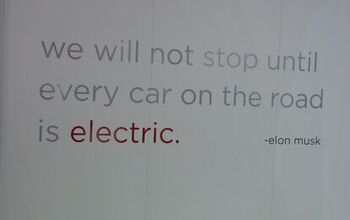Quote Of The Day: Tightening The Belt Edition
The Spanish government’s crusade against cars continues this week as the national speed limit has been cut from 120 km/h (about 75MPH) to 110 km/h (about 68 MPH). The Spanish government claims the move is temporary (they say it will last until “at least” June), and that it will save some 15% on the country’s fuel bills. The opposition reckons the number is closer to five percent, asking Autocar the rhetorical question
What next? Will the government make people go to sleep earlier to reduce their consumption of light?
Spain’s many high-quality roads and relatively low traffic have made it something of a motoring destination for Northern Europeans (especially the British), but since most European nations allow speeds of up to 130 km/h on their freeways, some of that cachet could well be lost. The opposition reckons the government reduced Spain’s speed limit as much to raise revenue as save fuel. Could losses in the tourism sector cancel any revenue benefits?
More by Edward Niedermeyer

































Comments
Join the conversation
When the first oil shock hit in March 1973, I was still in the air force, gas went from 24-25.9¢ per gallon to 31-32.9¢ per gallon literally overnight. I immediately cut my speed to 55 mph - I don't know why I chose that number, but I was ahead of the game. Later, in early 1974 when things really got stupid and the recession hit, the gov't suggested a 10 gallon per week limit, and although it went nowhere, I tried that and it worked for me for a little while, but cars were all pretty much gas hogs at the time, and you needed much more than that to get around, at least for me. Cutting the speed does cut fuel costs, but you pay for it in time if you're traveling anywhere, and in commuting, the slow drivers will get slower. What's the answer? Flying cars. We were supposed to have them by now.
Spain's government is desperate to act like it is doing something - anything. The nation has so many debacles (i.e. unemployment over 20%, a collapsing real estate bubble, debt it is certain to default on), and the government has many embarrassments (such as the massive, disastrous, job-destroying push into alternative energy from which it is furiously backpedalling). So, here come the micro-initiatives... an endless series of trivial, empty gestures aimed at creating a false impression that the government is still in the driver's seat and quality of life is improving.
I'm of the opinion that this move has much more to do with the economic situation in spain than just saving gas. If wages and employment are both static and below traditional, or desired, levels, then tax-income will also be lower than needed. If people are forced to spend more on gas, they will be spending more on the 'external economy', where the money goes offshore - in this case to the crude-oil producers. This means less remains to be spent within the internal (spanish domestic) economy. No jobs are created when people buy more liters of gas at a higher price at each fill-up. But the other kinds of purchases which create jobs in shops, or service industry, etc., can't happen when high consumption at high prices consumes the disposable income of a stagnant salary. Spain as a member of the EEC also doesn't have the option of printing more money to cover that which is going off-shore (as the US is able to do - but for how long?) So, until spain can attract more FDI and increase exports, or tourism, it has to try and keep cash circulating in its economy. One way to do this is to reduce fuel consumption by reducing speed. If the economy in spain slows down due to people spending less, and companies respond by cutting jobs, spain which is close to the edge when it comes to paying off its government bond-holders, may sail into the sea of default. And to be honest, the speed reduction in spain is not that bad... much of germany has 130 kph limts and here in switzerland we have a limit of 120 kph.
Never thought of higher speed limits causing more tourism. Might be another good argument for raising them. If I could get to Seattle in 3 hours instead of 4.5, I might go more often. If people want to pay the higher prices to drive faster let them. If you don't, then drive slower. Heck, in some ways, the faster drivers would subsidize the slower ones, since they'd pay more in fuel taxes. The problem is the central control. A single solution generated by the government that is somehow supposed to work for everyone and then rarely does. Sill anyway, you know they're gonna get the money they need from Germany.... The Euro is ridiculous.